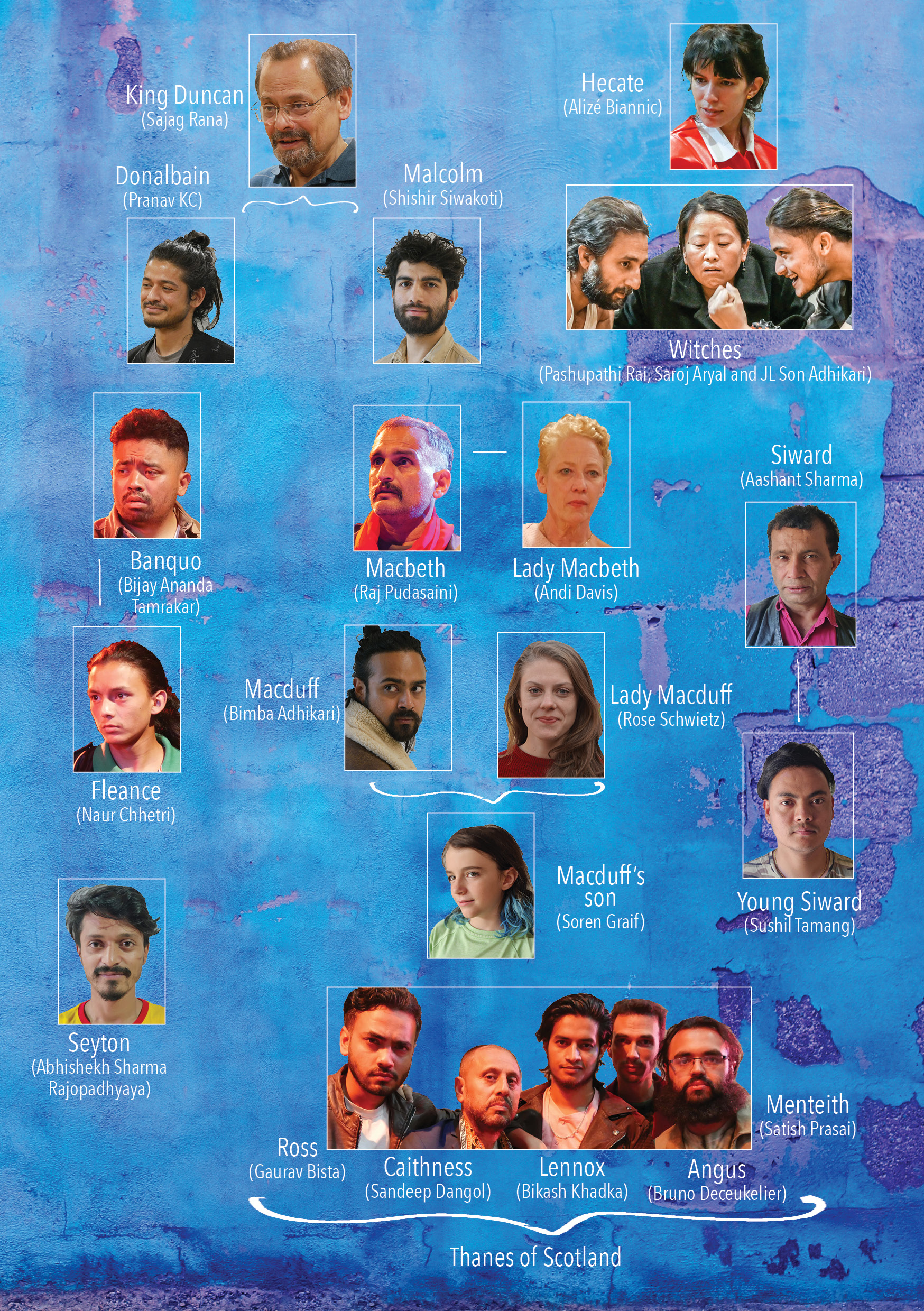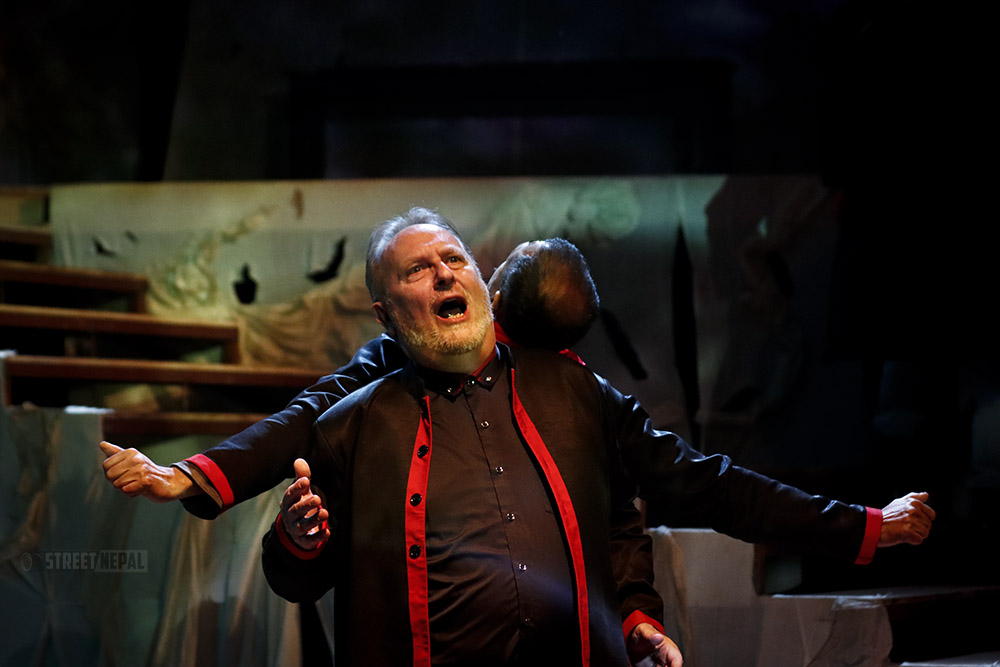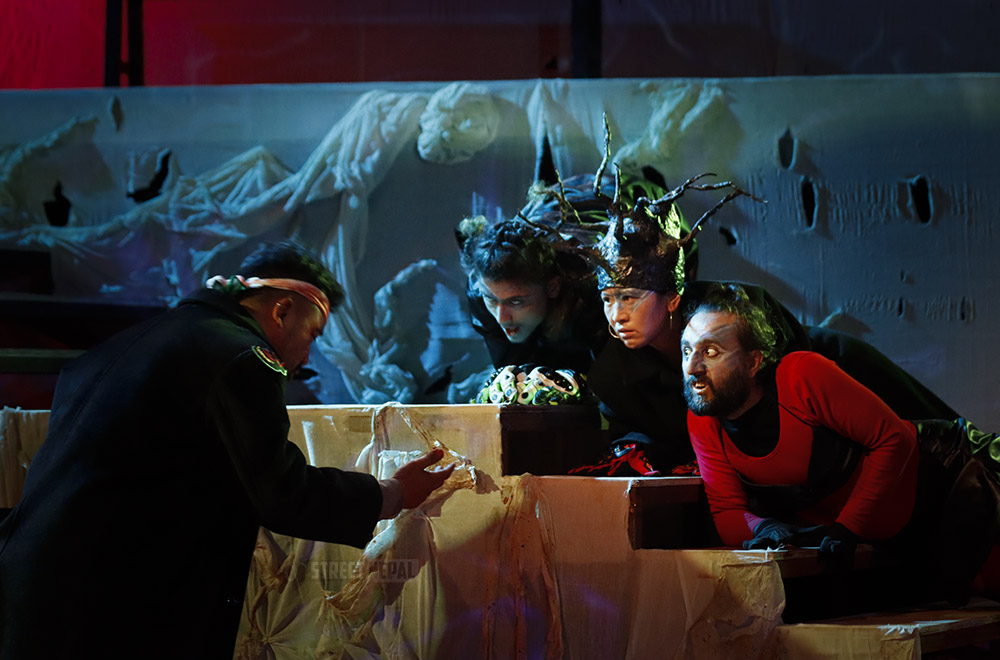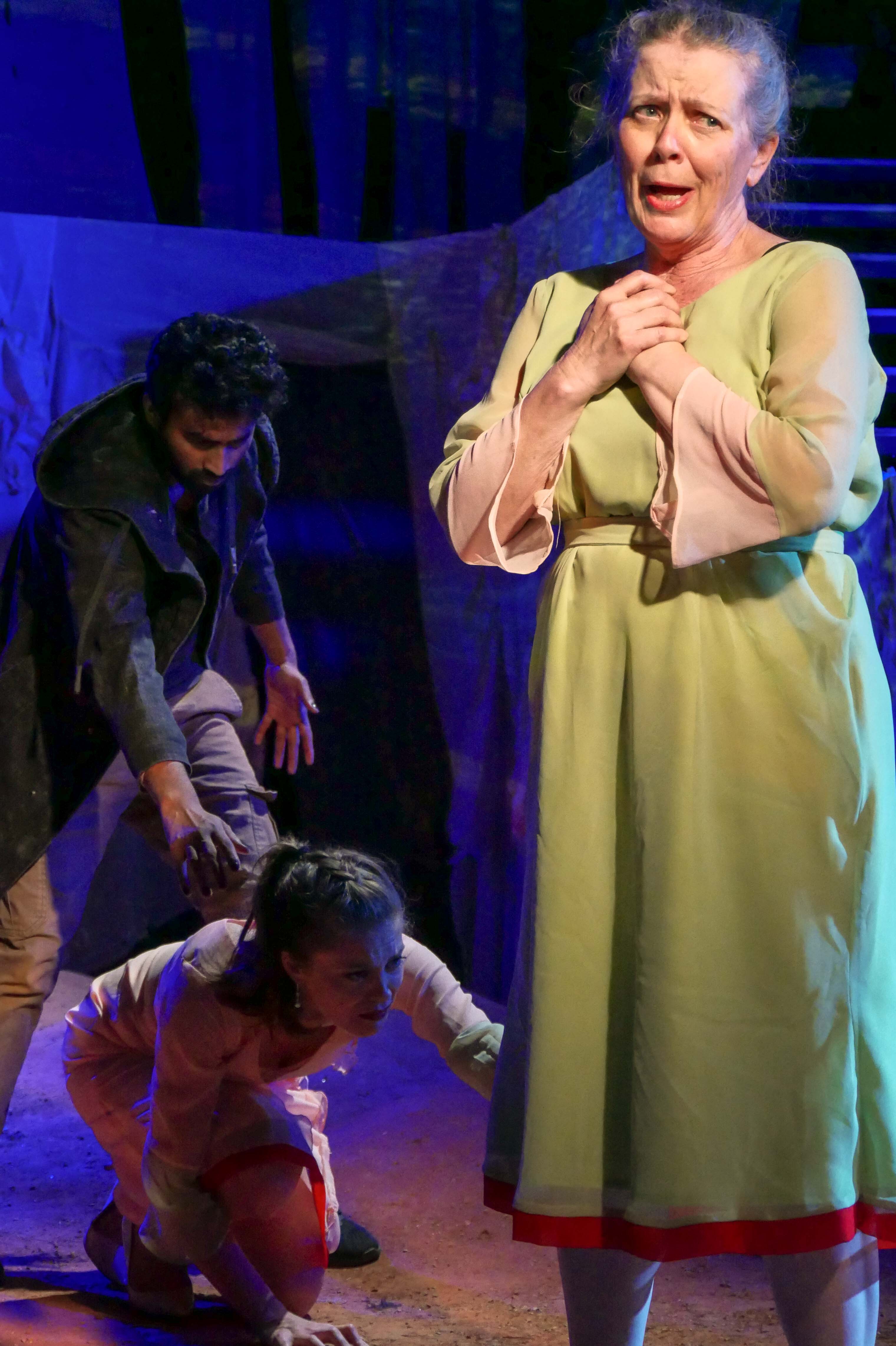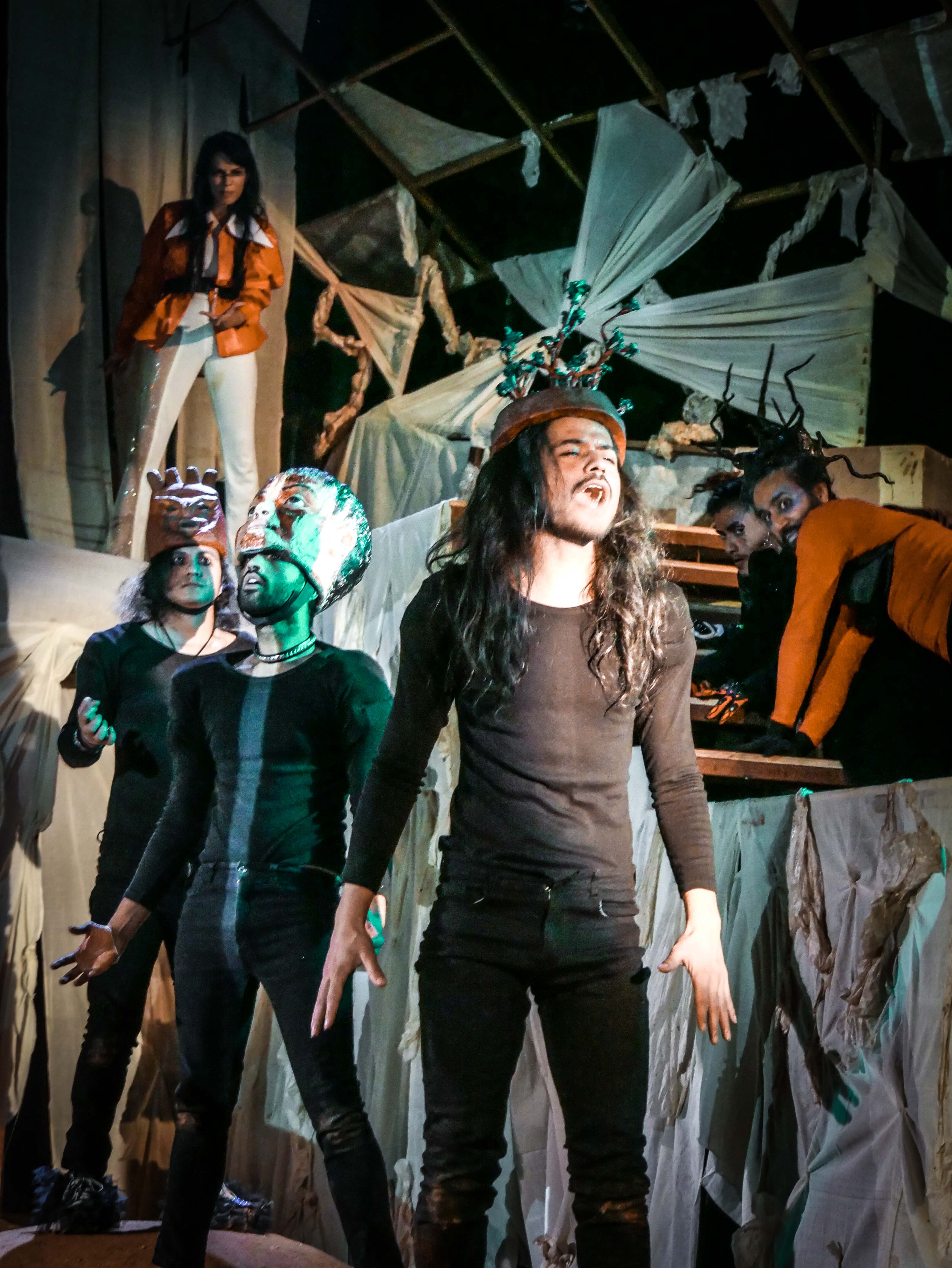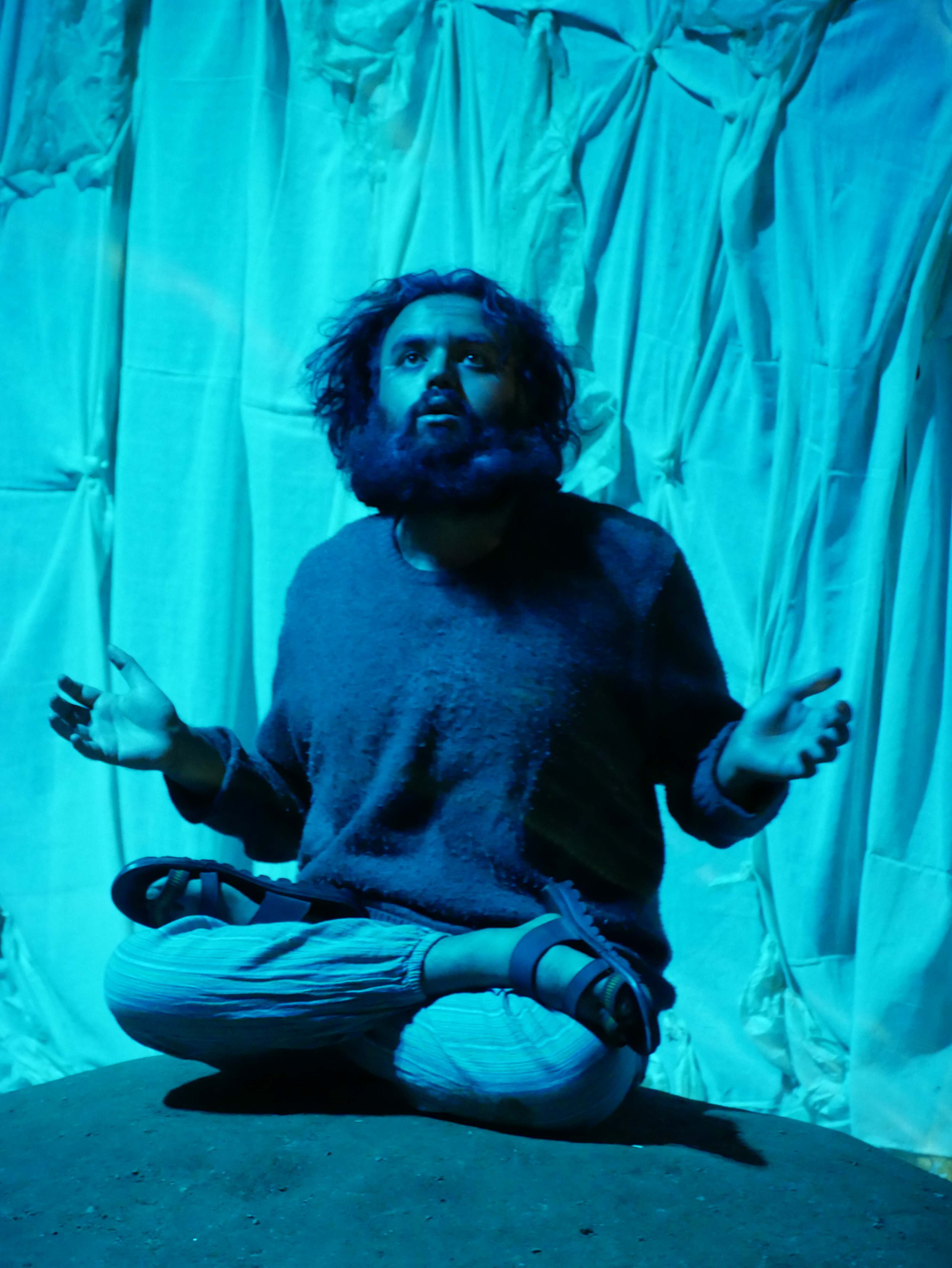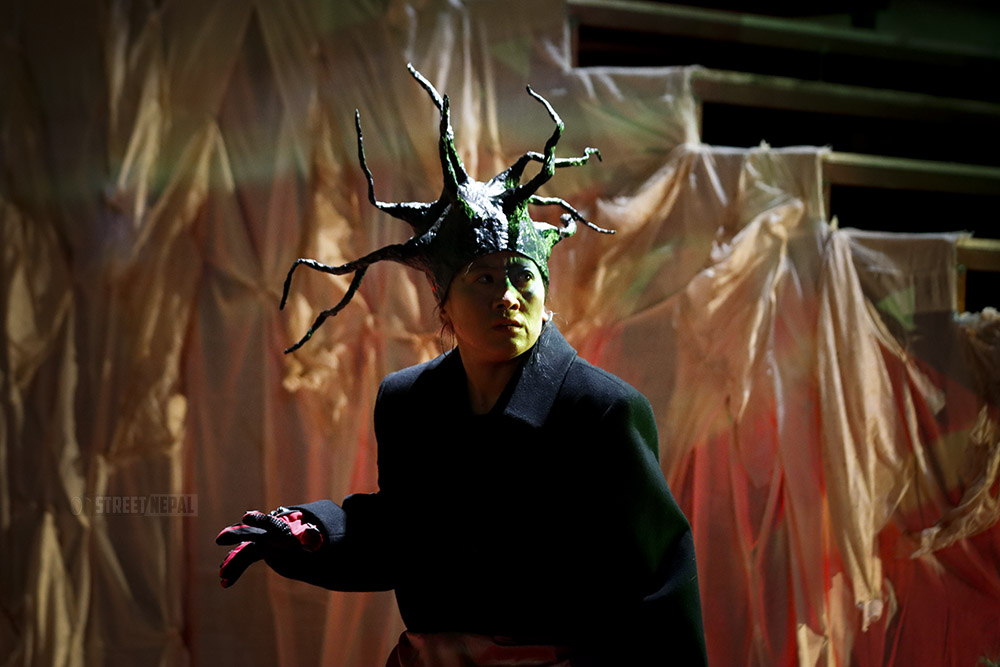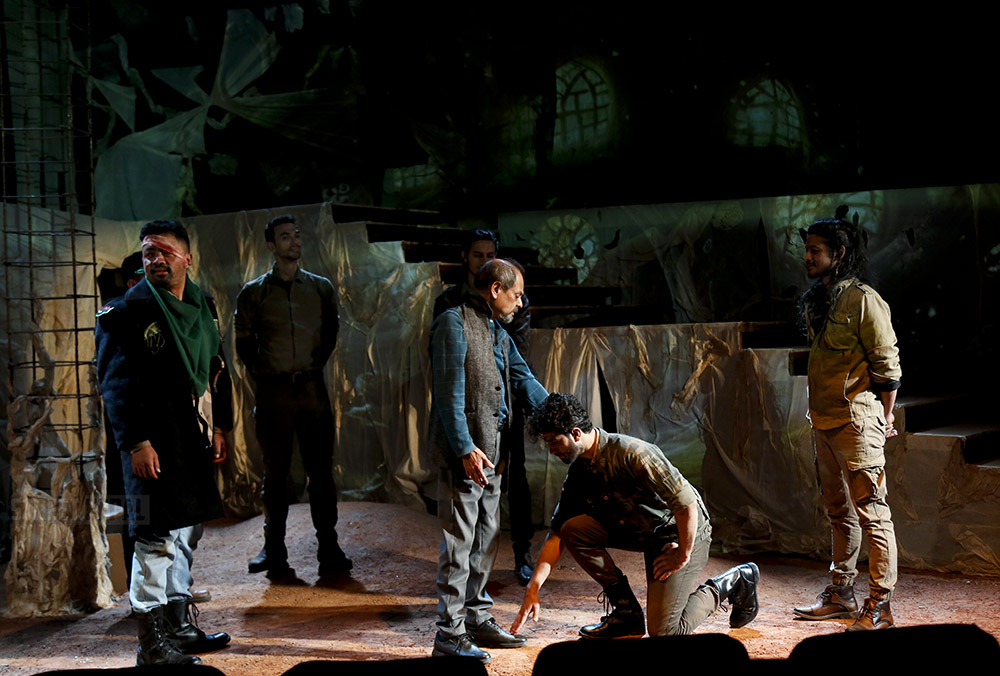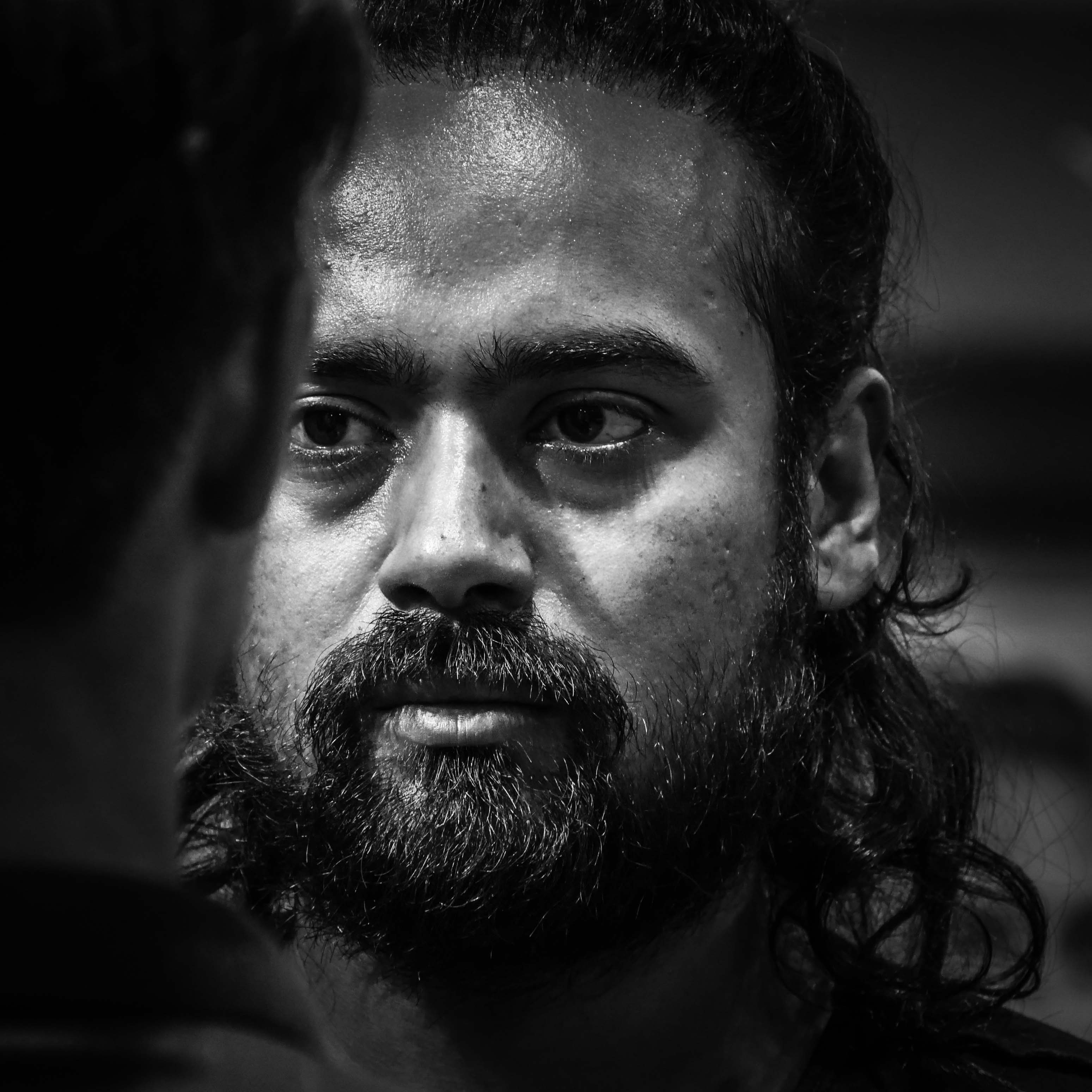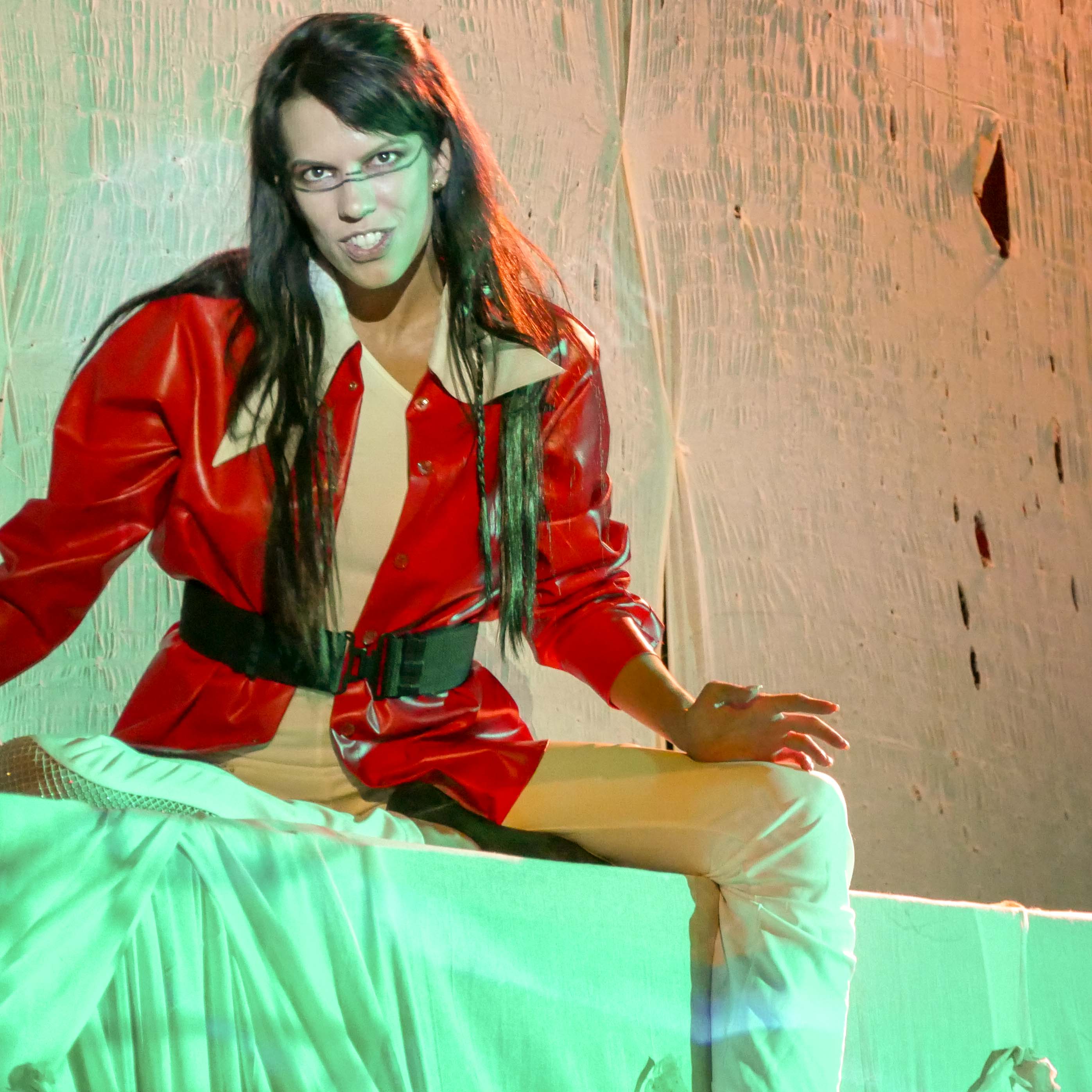Macbeth Massacre
A play by Shakespeare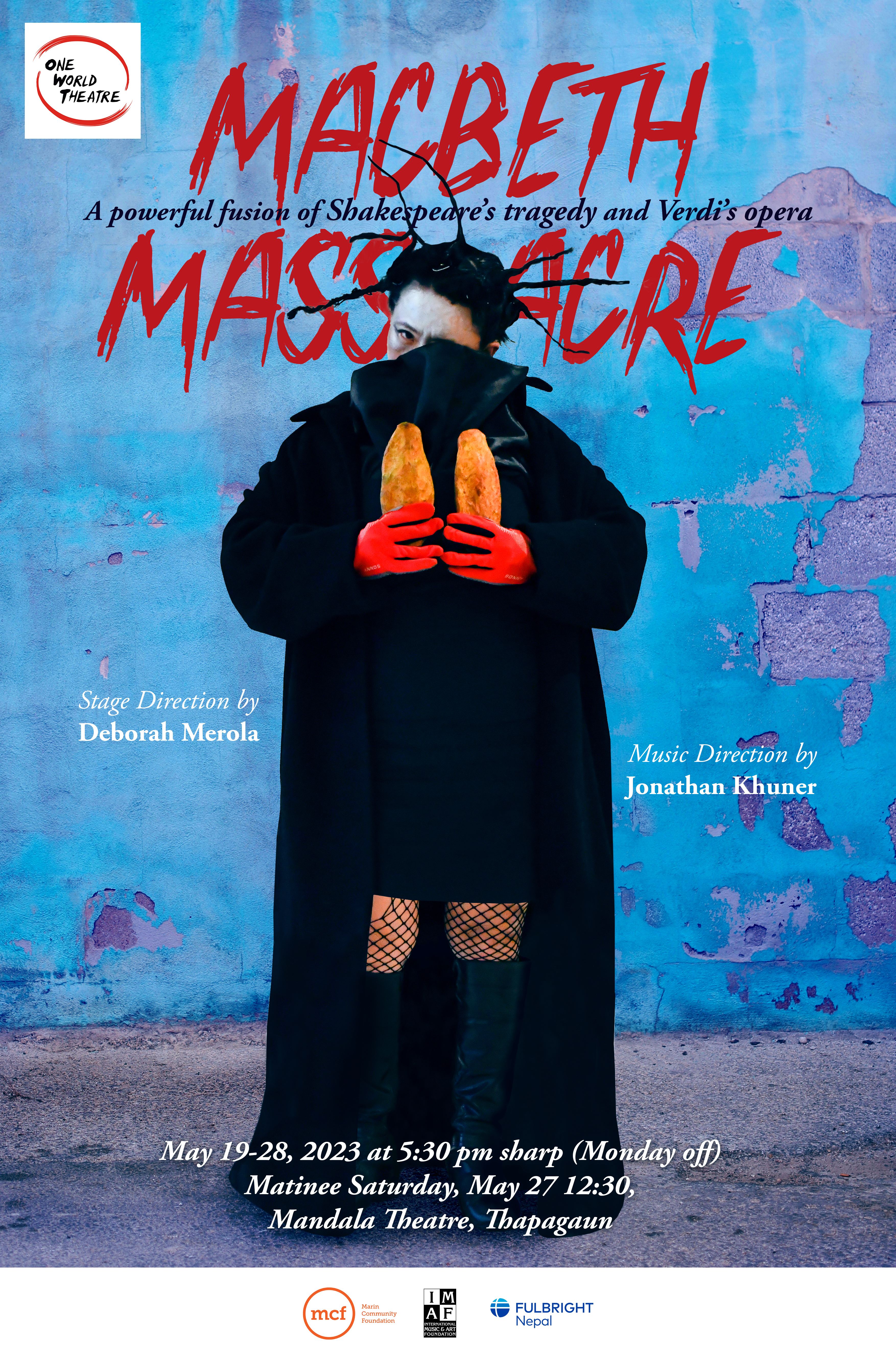
Something wicked this way comes…
Macbeth Massacre brought the excitement and power of two great works of art in a fusion of theatre and opera, created and directed by OWT Artistic Director Deborah Merola and Music Director Jonathan Khuner of the San Francisco Opera and the Metropolitan Opera. Lead actors Rajkumar Pudasaini as Macbeth and Andi Davis as Lady Macbeth with a cast and crew of 69 Nepali and international artists, joined by the visiting renowned opera performers Roy Stevens, Annalisa Winberg and Jillian Khuner. Shakespeare’s immortal verse blends with sections in Nepali, and the Italian libretto and music by Verdi, in this polyphonic work of sweeping grandeur and piercing insight.
DIRECTOR'S NOTE: DEBORAH MEROLA
What happiness to come full circle and welcome back the wonderful opera friends from the USA, who helped us create the 2016 fusion opera Arjuna’s Dilemma, now for an equally challenging and exciting fusion of Shakespeare’s drama and Verdi’s opera in Macbeth Massacre. Returning to Nepal are maestro Jonathan Khuner, the sung Macbeths Roy Stevens and Annalisa Winberg, scenographer Greg Mitchell, and sound designer Lucky Peckham.
Again, we collaborate with local artists and expats, including instrumentalists from the Kathmandu Jazz Conservatory and community singers, plus youth from The British School. Our large cast and production group is also international, with our marvelous Shakespeare Lady Macbeth Andi Davis travelling from California, along with soloist Jillian Khuner, and actor Caroline Hodson—all three in Nepal for the first time.
However, true to One World Theatre’s mission, we predominantly feature Nepali artists, here providing employment and training to over 30 individuals, several in both acting and production roles. While I was cautioned that Shakespeare could not be credibly performed in English in Nepal, I hope you will find my trust in our brilliant and devoted Nepali actors vindicated, with uniformly fine performances and some that could rival Shakespeare performed on any stage.
With special thanks to Rajkumar Pudasaini who worked for months on the Shakespearean English for a role that predominates in the play, helped especially by his Lady Macbeth Andi Davis. When I see this very large group of young, adult, community and professional, Nepali and international artists working respectfully, creatively and joyfully together, I feel too that my choice to devote the last thirty years of my life to theatre in Nepal and One World Theatre, has been the best choice I ever could have made.
I am in your debt. Deborah
NOTE FROM MUSIC DIRECTOR: JONATHAN KHUNER
Giuseppe Verdi with his librettist Francisco Maria Piave did their best to extract the most powerful scenes and portray the deepest emotions of Macbeth within the constraints of 19th-century Italian Opera. Verdi's style of presentation in 1845 differs radically from Elizabethan theatre of 1605. Instead of the continuous chain of short scenes which makes Shakespeare so intense, Verdi’s operas feature melodic plot-moving sections, alternating with expansive song-like reflections on dramatic moments, when the action stops and the characters voice their feelings in song-like numbers (arias, duets, large ensembles).
Operatic vocalization is quite different from spoken theater, the sense of time in opera is greatly expanded, and the amount of text used is considerably less. As a consequence, there are fascinating, major challenges to fusing the great strength of these two masterpieces, each in its own characteristic language and form.
We hope that our original melding of distinct genres on the same overwhelming story will bring forth rich interplay, hidden aspects, and a distinctly powerful experience. As a conductor, I have found the process uniquely rewarding despite its distinctive difficulties.
Scenographer Greg Mitchell, designer for Arjuna’s Dilemma and The Flight, uses powerful shadows on the colour saturated blue, sienna and blood red walls, torn open by bombardments. The costumes by Aagya Khanal integrate high-concept fashion designs with a timeless haunted quality. The small orchestra includes accomplished musicians from the Kathmandu Jazz Conservatory and a Verdi chorus with professional opera and local a capella ensemble Ananda.
Also part of the production team are production manager Amrit Dahal, assistant director Rose Schwietz, stage manager Manish Byanju, sound designer Lucy Peckham, scenographer Greg Mitchell, props by Suryaman Limbu, choreography by Alize Biannic, masks by Kripa Khadgi and costumes by Aagya Khanal.
The audience is confronted with sounds of distant artillery and a set based on a recent photograph of an inferno in an Iranian prison. The operatic Lady Macbeth and Macbeth appear from the recesses and trail surreal elements from the 19th-century Kot Massacre. The Witches rise out of the battlefield mist and mounds of beaten earth, their bodies contorting and expanding like the yarn of fates unfurling. Lady Macbeth washes and wrings her bloody hands and Macbeth seems to wade through blood, with evocative lines and images projected upon the ruin, “What bloody man is this?” and “What are you afraid of?”
Macbeth Massacre pushes the boundaries of One World Theatre’s repertoire while keeping our commitment to outstanding acting and innovative production design. In addition to featuring a cast and production team of primarily Nepali artists, the immersive adaptation addresses Nepal’s own historic trials and tribulations, power struggles and court intrigues – much of which is now gradually disappearing from collective memory – by way of Shakespeare and Verdi.
NOTES
- This 2h45 old English-language play with an intermission features sections from Guissepi Verdi’s Italian opera and several sections spoken in Nepali.
- Trigger warning: the play features loud rifle reports, secual innuendo, staged violence, including the murder of a young boy, as well as references to suicide.
- Tickets for the show can be purchased through Mandala Theatre here or booked by phone 01-5245147.
-
- Patron seats (extra legroom): 1.000NPR
- Standards seats: 500NPR
- Students (max. 50 per show): 300NPR
-
- Performances:
-
-
-
- Fri. 19 May at 5.30
- Sat. 20 May at 5.30
- Sun. 21 May at 5.30
Mon. 22 May: no show - Tue. 23 May at 1.30 private student show with British School
- Tue. 23 May at 5.30
- Wed. 24 May: 11.30 private student show with NCCS
Wed. 24 May at 5.30: No show - Thu. 25 May at 5.30
- Fri. 26 May at 5.30
- Sat. 27 May at 12.30
- Sat. 27 May at 5.30
- Sun. 28 May at 5.30
-
-
MUSIC
Shakespeare’s Scottish play predominates in the first part of the performance when the triumphant Generals Macbeth and Banquo are greeted by the prophetic witches, choreographed by Alize Biannic who also appears as Hecate. At the fateful entrance of King Duncan to Inverness Castle, the Verdi singers of Macbeth and Lady Macbeth begin to stir and descend from the dusty upper reaches of the castle ruin. These Royal Ghosts start to overtake and blend with the actions and conscience of Macbeth and Lady Macbeth and enact bloody massacre, like a reoccurring curse, a national memory or a rising blood lust.
Soon the opera singers join the ghosts of the murdered King Duncan and Banquo to haunt Macbeth’s banquet, and follow the downward spiral of the Macbeth and Lady Macbeth into sleeplessness and madness. Macbeth only courageously rouses himself when Malcom, son of King Duncan, and his army advance on the castle carrying branches, again enveloping the audience in a modern and mythic battlefield.
In an exciting musical juxtaposition, the basic Verdi score is played at the keyboard by the brilliant Jonathan Khuner, with other instrumentalists joining in quasi-improvisatorially on both western and eastern instruments. The Shakespeare is lightly underscored in a more improvised fashion, and with more reliance on eastern instruments, while the Verdi sections are performed with keyboard accompaniment rather strictly as composed, and western classical instruments adding to the harmonic and melodic givens. Some sections, delivered in Nepali, are repetitions of material first set forth in English and particularly powerful accompanied by Eastern or amalgamated music, and more highlighted interpretive dance. Music piped in from other directions echoes through the halls.
RELEVANCE
Belief in witchcraft, overweening ambition, and the murder of kings in the earlier Rana era and the Palace Massacre in 2001 are themes that will resonate in Nepal, costumes mixed with modern Nepali dress: women in sari, and the men in Army uniforms. For contemporary America, magical thinking, conspiracy theories, and a President who some fear would be King can strike a chord. In both countries, the haunting memory of civil war, assassination and murder can strike fear. However, both the transcendent dramatic text and operatic score circle into a great moral center that ultimately is reassuring about the cost of evil and the triumph of good.
PLOT SUMMARY
Three witches anticipate a meeting with Macbeth. King Duncan hears a report of how his generals Macbeth and Banquo defeated the Norwegians and the Scottish rebels. The witches gather on a heath and meet the generals returning from the war. They predict Macbeth will become Thane of Cawdor, and one day king, and that Banquo will be the father of kings. Macbeth is then greatly impressed when he is greeted by Ross and Angus with the title of Cawdor.
Duncan greets Macbeth with great praise and proposes to visit him. Macbeth writes to his wife telling her of what has happened and the King’s plans. Lady Macbeth, seeing the opportunity, plots with her husband how they might kill Duncan when he arrives. After initial enthusiasm, Macbeth changes his mind, but Lady Macbeth persuades him to carry out the deed. He murders Duncan, making it seem that the servants were to blame and describes the scene to his wife. She finds herself having to return the daggers he has used to Duncan’s bedroom, and her hands become covered with blood too. They retire when they hear repeated knocking at the castle gates.
Macduff and Lennox arrive, and have a brief exchange with the Porter. Macduff discovers the dead king and rouses the castle. Malcolm and Donalbain, fearing blame for their father’s death, flee abroad. Soon after, Ross and Macduff reflect on what has happened, and Macduff reports that Macbeth has been made king.
Macbeth is concerned about his position, very aware of the prophecies about Banquo. He arranges with a group of murderers to kill Banquo and his son Fleance; they succeed with Banquo, but Fleance escapes. At a dinner that night, where Banquo would have been the chief guest, Macbeth is terrified by the appearance of his ghost. Macbeth decides to return to the witches to find out his fate. They tell him that he should fear Macduff, that no man born of woman can hurt Macbeth, and that he will never be vanquished until Birnam Wood comes to Dunsinane. They then show apparitions making predictions.
Macbeth learns that Macduff is fled to England, so he arranges the death of Macduff’s wife and children. Macduff meets Malcolm, who tests Macduff’s allegiance to Scotland by first painting a bleak picture of his own personality as a future king, then revealing his true character. They agree to fight together, with English support. During the meeting, Ross brings news of the murder of Macduff’s family. In Scotland, a doctor and gentlewoman observe Lady Macbeth sleepwalking, imagining she cannot clean her hands of Duncan’s blood.
The Scottish nobles gather, and Malcolm orders his men to camouflage themselves with tree branches as they attack, thus giving the appearance of Birnam Wood approaching Dunsinane. Macbeth learns his wife has died. Fearing no man born of woman, Macbeth fights on, killing Young Seyward, but on meeting Macduff he learns of Macduff’s caesarian birth. Macbeth refuses to yield, is killed by Macduff, and Malcolm is proclaimed king.
A more detailed scene overview to better understand and follow the play can be found here.
- For educators:
- Twinkl: https://www.twinkl.com/resources/ks2-story-book-resources/ks2-stories-shakespeare/ks2-stories-shakespeare-macbeth
- British Council Kids summary of Macbeth: https://m.youtube.com/watch?v=Oo9vPZczdbQ
- British council teen summary: https://learnenglishteens.britishcouncil.org/study-break/video-series/shakespeare/shakespeare-macbeth
- Summary of Macbeth: https://www.shakespeare.org.uk/explore-shakespeare/shakespedia/shakespeares-plays/macbeth/
- How to teach Shakespeare to ESL students: https://www.britishcouncil.org/voices-magazine/how-make-shakespeare-easy-english-language-learners
- Want to know more about Shakespeare himself? https://www.shakespeare.org.uk/explore-shakespeare/shakespedia/william-shakespeare/william-shakespeare-biography
- Journalists can access photos, interviews with cast and production members here.
PRODUCTION TEAM
Created and directed by OWT Artistic Director Deborah Merola and Music Director/Music Arranger Jonathan Khuner of the San Francisco Opera and the Metropolitan Opera, Macbeth Massacre will feature stage actor Rajkumar Pudasaini in the dramatic role of Macbeth and Andi Davis as Lady macBeth, as well as in very special cameos, the international opera performers Roy Stevens, Annalisa Winberg and Jillian Khuner appear in sung roles for respectively MacBeth, Lady MacBeth and Lady MacDuff, supported by celebrated OWT Company Actors, the Kathmandu Chorale and local a capella group Ananda, as well as a Youth Ensemble with students from the British School.
DEBORAH MEROLA, Macbeth Massacre Director, is a Ph.D. in Dramatic Arts from the University of California at Berkeley, a 2003 and 2011 Senior Fulbright in Theatre in Nepal, and the Founding Artistic Director of One World Theatre. Professor Merola has produced and/or directed more than 80 full-length theatre productions, including original adaptations for the stage, devised productions and Western dramas, with a focus on iconic American plays by Odets, O’Neill, Miller, Albee and Shepard, and cutting-edge contemporary plays by Tony Kushner, David Mamet, Terrell Alvin McCraney, Nilo Cruz and Moises Kaufmann. She also has created multi-lingual plays on Nepali subjects: Nepali Aama; Ishq, the Madness of Love; Telling a Tale: Kitchen Dramas; and Love in Kathmandu; and directed Arjuna's Dilemma, the first fusion opera produced in Nepal, with the same group of outstanding opera artists and designer who have returned for Macbeth Massacre.
JONATHAN KHUNER, Music Director & Conductor, after receiving degrees in Mathematics and Music at the University of California at Berkeley, has been working in opera for the last 40 years, at major US opera companies, and occasionally abroad. Jonathan led the first ever Wagner opera production in Albania with Roy Stevens and Annalisa Winberg, Tannhäuser, at the State Theater in 2013. He is the Musical Director of West Edge Opera in Northern California. This April he led a production of Richard Strauss’s Der Rosenkavalier at Pacific Northwest Opera in Washington State. One World Theatre's Macbeth Massacre is his second appearance in Nepal; he was musical director and conductor for the company’s Arjuna’s Dilemma in 2016. He resides in Berkeley, California, with his wife Jillian.
GREG MITCHELL, Scenic Designer, is a visual artist working in live performance and interactive installation. The leading edge of his work is often site-specific, seen in challenging locations and landscapes that are not traditional performance and art venues, and historical or sacred locations requiring extra care and sensitivity whilst translating to public venues. His work has been seen in lighting, projected media, scenery and interactive installation designs in venues ranging from UNESCO world heritage sites in Nepal, Central America, Ireland, the Coney Island Boardwalk in Brooklyn, inner City Washington DC, and the remotest parts of the Black Rock Desert in the Western US. He tends to bring his skills to socially-relevant works in which his contributions may help to make a difference to people in need and underrepresented communities. Greg is a Full Professor of Theater Design at the University of California at Santa Barbara and a proud member of United Scenic Artists, Local 829.
LUCY PECKHAM, Sound Designer, is a musician, field recordist, and sound effects creator based in Alaska. Lucy is delighted to return to One World Theatre and Kathmandu. Her particular creative happy place is where theatre and music meet, often recording her arrangements or compositions with live musicians for theatre productions. Her recent US regional credits are with Perseverance Theatre, TBA Theatre, Ping Chong & Co, and Thalia's Umbrella. International credits include Arjuna's Dilemma with One World Theatre in Kathmandu, Nepal, and a recording project in Bogotá, Colombia at the Bogotá Museum of Modern Art (MAMBO) with members of the Bogotá Philharmonic Orchestra.
ROSE SCHWIETZ, Assistant Director & Performer, (Lady Macduff, Witches Chorus), is a director/performer/educator from Minnesota. She has spent nearly ten years in Nepal, teaching theatre and English literature to Nepali high school students, and directing and performing with One World Theatre. She trains regularly with SITI Company in Suzuki and Viewpoints methods, and she is a member of Agile Rascal Bicycle Touring Theatre. She is also a Directing MFA candidate at the University of Massachusetts Amherst. When she’s not on her bike or in rehearsal, you can find her reading, writing, learning a new sport, or playing cribbage. Her greatest love in theatre is the collaborative process of building, creating and performing together. Her most recent project was Deurali Daandi, the culmination of her Fulbright US Student Research Grant.
CAROLINE HODSON, Assistant to Director and the Children’s Ensemble, (Gentlewoman, actor), is an education specialist from California. She has a master’s degree in Special Education and a bachelor’s degree in English Literature with an emphasis in Creative Writing Fiction. She has taught and performed in many Shakespearean plays, including the role of Antipholus of Syracuse in The Comedy of Errors, Desdemona in Othello, and a saxophone playing Mustard Seed in The Midsummer Night's Dream. This is her first time visiting and performing in Nepal. In addition, she has loved working with the staff and students at The British School to develop the Children’s Ensemble and sharing the joy of theatre with young students.
- Production manager: Amrit Dahal
- Stage manager: Manish Byanju
- Assistant Stage manager: Abhishekh Sharma Rajopadhyaya
- Costumes: Aagya Khanal, with Pashupati Rai and Caroline Hodson
- Props: Suryaman Limbu
- Weapons: Aaditya Mishra
- Masks: Kripa Khadgi
- Props Collector: Sadin Luitel
- Choreographer: Alizé Biannic
- Sound Assistant: Satish Prasai
- Projection assistants: Momin Pradhan and Sanskriti Duwadi
- Publicist, Social Media: Sushil Tamang
- Press Outreach: Ashish Dhakal Koirala
- Poster Design: Siddhanta Pudasaini
- Video/Photographer: Joti Man Singh, Sushil Tamang and Bruno Deceukelier
- Postering: Sadin Luitel
- Flute, Bansuri: Sabin Katuwal
- Keyboard: Saurav Shrestha
- Percussion: Sahil Laheja
- Piano: Jonathan Khuner
CAST MEMBERS
RAJKUMAR PUDASAINI, Theatre Practitioner, (Macbeth, actor), has been an international theatre practitioner and actor based in Kathmandu, Nepal since 2002, and has directed plays since 2016. He has also performed and trained in over 8 countries, including Culture Corporation Kathmandu; Gurukul Nepal; Figutreat Stumsund, Norway; Pashupat and Odin Theaters, Denmark; Rangabhumi Bangladesh; and PUSH Physical Theatre, New York. His performances are rooted in the explorations of human conflict and storytelling; and he works with varied approaches like physical theatre, improv and social theatre. Select acting credits include Krishna (Arjuna's Dilemma), Irfan Cabot (Desire Under the Elms), Multiple roles (Caucasian Chalk Circle), and Mr. Frank (Diary of Anne Frank). He also works in production management and creating international collaborations based in Nepal.
ANDI DAVIS, (Lady Macbeth, actor), has been in love with theater and dance her entire life. After studying dance for years as a young person, she discovered Shakespeare and the world of theater. She followed this with studying Drama at The Juilliard School in New York City, where she was allowed to delve deeper into classical theater. After graduation, she was fortunate to work with The Public Theater and Shakespeare in the Park, playing in Measure for Measure with Kevin Kline. Andi then found a place in Tony Randall’s (The Odd Couple) classical theater company The National Actors Theater, run out of The Lyceum Theater on Broadway. She has taken a long hiatus to raise children and is thrilled to be back in theater again. Andi would like to dedicate her performance in this production to her brother Ryan who passed away in the midst of the rehearsals. One of his last messages to Andi was to share that he was so proud of her achievements and we hope he will enjoy the show from his balcony seat.
ROY STEVENS, Opera Modesto General Director, (Macbeth, vocalist), has been an international opera singer since 1987 and the General Director of Opera Modesto since 2018. His career includes leading performance in theaters and with symphony orchestras in 20+ countries, on 5 continents and in 14 languages: from the national theaters of Albania and Guatemala to Italy’s La Scala, the Metropolitan Opera in New York, Dresden Semperoper, Teatro Liceu in Barcelona and Teatro Nacional de São Carlos in Lisbon. He has enjoyed playing with vocal categories and has performed internationally as a bass baritone, dramatic baritone, heldentenor and buffo basso. He progressively moved towards active roles as Producer, Organizer and Casting Director, leading and partnering in the creation of international collaborations in Albania, Panama and Nepal, as well as organizing other events locally and regionally in California. He is delighted to return to Nepal.
ANNALISA WINBERG, Soprano, Artistic Director & Stage Director, (Lady Macbeth, vocalist), is an international opera singer who has performed with many orchestras and opera theaters around the world, including the Dallas Opera, Boston Opera Theater, German National Theatre of Weimar, New Israeli Opera, Tirole Festspiele, National Theatre of Guatemala, New York Opera Orchestra, the San Francisco Symphony Orchestra, and many others. She was part of the Albanian national Wagner premiere, performing both Elizabeth and Venus in Tannhaüser. She sang in Arjuna’s Dilemma in Nepal in a collaborative project with One World Theatre. She starred as Lady Macbeth in Verdi’s Macbeth with Opera Panama in site-specific UNESCO World Heritage Site production in the ruins of Panamá Viejo. For Opera Modesto, Annalisa has directed the US premiere of Sotelo’s Dulcinea, the world premiere of Kavasch’s Annabel, The Magic Flute, La bohème, Rigoletto, Carmen and Madama Butterfly.
JILLIAN KHUNER, Soprano, (Lady Macduff, vocalist, Witches’ Chorus) is an operatic soprano who has been featured with many California opera companies. For example, with Berkeley Opera she sang leading roles in Mozart’s Marriage of Figaro and Così Fan Tutte, Verdi’s La Traviata, Luisa Miller, and Macbeth, as well as Puccini's La Bohème, Girl of the Golden West, Madam Butterfly, and Douglas Moore’s The Ballad of Baby Doe. Jillian's principal teacher was Frank Baker, at Bennington College, and she also studied with Jan di Gaetani at The Eastman School of Music in Rochester. She sang for several years with the San Francisco Opera (chorus and small roles), and appeared for many years with the Bracebridge Dinner. She lives in Berkeley, California, with her husband Jonathan.
- Three Witches, the Weird Sisters, played by Pashupathi Rai, Saroj Aryal and JL Son Adhikari
- VERDI CHORUS OF WITCHES
- Verdi Witch/Macduff Aria, soprano: Jillian Khuner/USA
- Second Verdi Witch, soprano/mezzo: Rose Bettina Schwietz/USA
- Third Verdi Witch, mezzo/alto, Nadine Rogers/USA
- Forth Verdi Witch, alto, Naomi Saville/UK
- Fifth Witch, soprano/mezzo: Flo Gurung/UK
- HECATE: played by Alize Biannic
- DUNCAN, king of Scotland, played by Sajag Rana
- MALCOLM, his elder son, played by Shishir Siwakoti
- DONALBAIN, Duncan's younger son thane of Glamis, played by Pranav KC
- MACBETH, played by Rajkumar Pudasaini
- LADY MACBETH, played by Andi Davis
- SEYTON, attendant to Macbeth, played by Abhishekh Sharma Rajopadhyaya
- Three Murderers in Macbeth's service, played by Aakash Jha, JL Son Adhikari and Sadin Luitel
- DOCTOR, played by Sajag Rana & a Gentlewoman, played by Caroline Hodson, both attending upon Lady Macbeth
- THE PORTER, played by Aashant Sharma
- BANQUO, commander, with Macbeth, of Duncan's army, played by Bijay Ananda Tamrakar
- FLEANCE, Banquo's son, played by Naur Chhetri (फ्लोयोङ्ग)
- MACDUFF, a Scottish noble, played by Bimba Adhikari
- LADY MACDUFF, played by Rose Schwietz, aria by Jillian Khuner
- MACDUFF'S SON: Soren Graif
- Scottish nobles (thanes):
- ROSS, played by Gaurav Bista
- LENNOX, played by Bikash Khadka(Vicky)
- ANGUS, played by Bruno Deceukelier
- MENTEITH, played by Satish Prasai
- CAITHNESS, played by Sandeep Dangol
- SIWARD, commander of the English forces, played by Aashant Sharma
- YOUNG SIWARD, Siward's son: played by Sushil Tamang
- INJURED CAPTAIN in Duncan's army: Shreeshesh Shrestha
- The Old Man: played by Satish Prasai
- Messenger and servant, played by Diggaj Khatri
- Messenger: Milan Khadka
- Grooms: Sadin Luitel and Ashish Dhakal
- Apparitions: Aakash Jha, Milan Khadka, Pranav Kc
Youth ensemble from the British School:
- Maya Klein/UK, Nepal
- Indu Marwaha/Australia, India
- Maulik Aggarwal/Nepal
- Paridhi Agrawal/India, Nepal
- Anwen Clifford-Jones/UK, Australia
- Tanushka Acharaya/UK, Nepal
- Mateo Graif/USA
- Victoria Karki/Australia
- Shrishti Kedia/Nepal
- Bilos Kunwar/USA
- Upasana Pradhanang/Nepal
- Samraj Rayamajhi/USA
- Amata Vesela/Czech Republic
- Griffin Wells/USA
- Meera Samrat/India
- Aarambha Sharma/Nepal
THANKS TO:
- Charles and Gail Greene for sustained support since the founding of One World Theatre.
- Nickolas Thaw as a trusted creative ally. The Mala Arts Academy for rehearsal space
- The Kathmandu Jazz Conservatory, specifically Maria Fajardo and Tomás Carrasco for kindly providing space and rehearsal equipment
- Raju Shah for gracefully hosting our international guests
- Bruno Deceukelier, Managing Director, and Rose Schwietz, Senior Staff, for dedicated service and artistry.
- The British School for the education outreach and youth actors
- Thomas Pouppez, for excellent web and program design.
- Bev Hoffman, for special fundraising and years of support. The entire theatre community of Nepal
- David Kleiman who faithfully has stood by every One World Theatre production.
SUPPORT AND SPONSORS
This production was made possible with the support from the Marin Community Foundation, the International Music and Arts Foundation (IMAF) and Fulbright Nepal.

